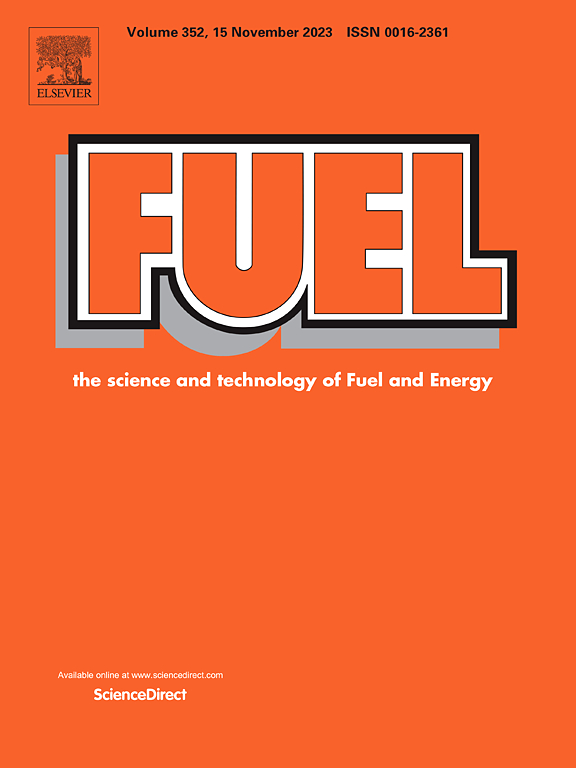从废物中提取生物炭作为厌氧联合消化的添加材料:间歇式和半连续式系统中的表征和应用
IF 6.7
1区 工程技术
Q2 ENERGY & FUELS
引用次数: 0
摘要
通过厌氧消化(AD)将有机废物转化为能源是一项既有利可图又环保的战略。改进工艺对于优化和最大限度地提高沼气和甲烷产量至关重要。为此,可以采用多种策略,如厌氧协同消化(co-AD)和使用生物炭。生物炭有助于提高工艺稳定性、提供缓冲能力、减轻抑制性毒素、固定微生物、促进微生物定植以及加速微生物之间的电子传递。本研究旨在利用不同的废物和热解温度生产生物炭,并研究生物炭在间歇式和半连续式系统中作为果蔬废物(FVW)和蛋鸡粪(LCM)共同厌氧消化的添加材料的用途。通过热重分析(TGA)和差示扫描量热法确定生物炭生产的热解温度,确定温度为 450 和 550 °C。在 120 毫升反应器(工作容积)中加入 10 克/升来自 FVW、LCM 和木材修剪废料(WPW)的生物炭后,进行了生化甲烷潜能(BMP)测试。WPW450 生物炭显示出最高的固定碳含量、粗糙的表面和深孔隙结构,与对照组相比,这些因素使甲烷产量增加了 28%。在 50 升反应器(工作容积)中进行了半连续试验,减少了 WPW450 生物炭的用量(1 克/升),提高了工艺稳定性和沼气质量,使甲烷产量增加了 31%。生物炭用量的减少并未对半连续式系统产生负面影响,该系统的甲烷产量比间歇式系统高出 74%。这项研究的结果突显了在不同规模的 FVW 和 LCM 共同厌氧发酵中添加生物炭以提高甲烷产量的重要性,以及对不同生物质和生物炭生产温度进行研究的重要性。本文章由计算机程序翻译,如有差异,请以英文原文为准。
Biochars from waste as an additive material in anaerobic co-digestion: Characterization and application in batch and semi-continuous systems
The conversion of organic waste into energy through anaerobic digestion (AD) is a profitable and environmentally friendly strategy. Enhancing the process is crucial for optimizing and maximizing biogas and methane production. To achieve this, various strategies can be employed, such as anaerobic co-digestion (co-AD) and the use of biochar. Biochar aids in process stability, provides buffering capacity, mitigates inhibitory toxins, immobilizes microorganisms, facilitates microbial colonization, and accelerates electron transfer between microorganisms. This study aimed to produce biochar from different wastes and pyrolysis temperatures and to investigate its use as an additive material in the co-AD of fruit and vegetable waste (FVW) and laying chicken manure (LCM) in batch and semi-continuous systems. Thermogravimetric analysis (TGA) and differential scanning calorimetry were performed to determine the pyrolysis temperature for biochar production, defining temperatures of 450 and 550 °C. A biochemical methane potential (BMP) test was conducted in 120 mL reactors (working volume) with the addition of 10 g/L of biochar from FVW, LCM, and wood pruning waste (WPW). WPW450 biochar showed the highest fixed carbon content, rough surface, and deep porous structure, factors that contributed to a 28 % increase in methane production compared to the control. Semi-continuous tests were conducted in 50 L reactors (working volume) using a reduced dosage (1 g/L) of WPW450 biochar, providing process stability and better biogas quality, resulting in a 31 % increase in methane production. The reduction in biochar dosage did not negatively impact the semi-continuous system, which showed a 74 % higher methane yield compared to the batch system. The results of this study highlight the importance of biochar addition to increase methane production in the co-AD of FVW and LCM at different scales, as well as the study of different biomasses and temperatures for biochar production.
求助全文
通过发布文献求助,成功后即可免费获取论文全文。
去求助
来源期刊

Fuel
工程技术-工程:化工
CiteScore
12.80
自引率
20.30%
发文量
3506
审稿时长
64 days
期刊介绍:
The exploration of energy sources remains a critical matter of study. For the past nine decades, fuel has consistently held the forefront in primary research efforts within the field of energy science. This area of investigation encompasses a wide range of subjects, with a particular emphasis on emerging concerns like environmental factors and pollution.
 求助内容:
求助内容: 应助结果提醒方式:
应助结果提醒方式:


